1. Three Year Numbers—S&P +38% vs. IJR Small Cap +0.04%
Ryan Patrick Kirlin

2. 2020 Rebound…Growth Still Leads, Large Cap Still Leads and Tech Still Leads
LPL BLOG
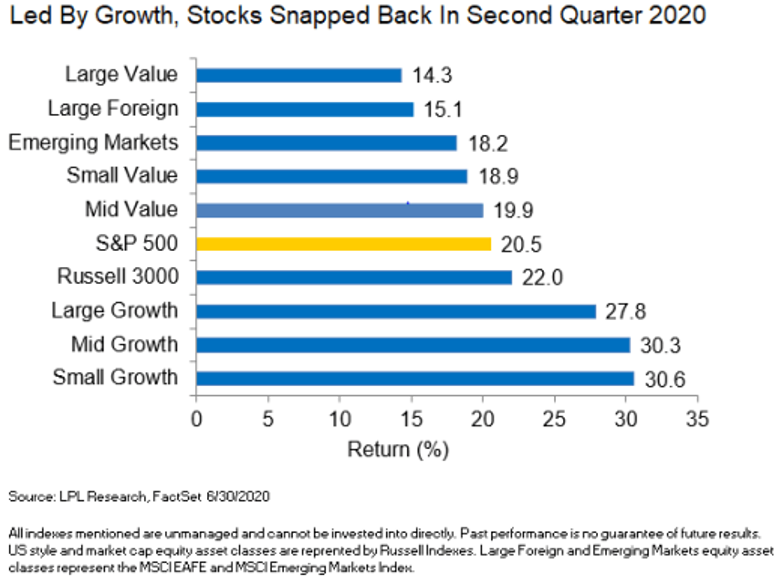
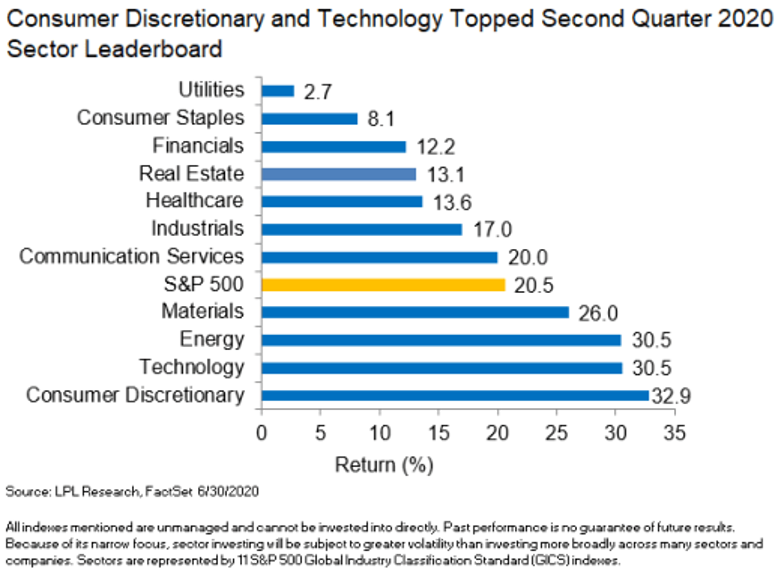
Taking Stock at the Halfway Mark
Posted by lplresearch https://lplresearch.com/2020/07/08/taking-stock-at-the-halfway-mark/
3. Financial Sector Share of S&P Cut in Half Since Mid-2000’s
The Definancialization of US Equities-Bespoke.
The huge underperformance for banks so far this year has helped the S&P 500 Financials sector see its share of weighting in that broad index continue to collapse. From just shy of one-quarter of market cap in the mid-2000s to the mid-teens share most of the past decade, the S&P is now to a large extent “definancialized” as the share of its market cap accounted for by financial sector stocks is about as low as it has gotten in the past forty five years. Longer-term, there’s precedent for further declines, though. As shown in the chart below, Financials were less than 5% of the index back in the 1940s. While we aren’t predicting a return to that level, it can’t be outside the range of possibility given the collapse in Financials’ share over the past few years. We’ve already seen the Energy sector’s weighting fall from 15% or so in the mid-2000s down to <3% as well. We discussed this chart and other retail enthusiasm indicators in last night’s Closer report, which is available to Bespoke Institutional members. Click here to start a two-week free trial.

4. Hedge Funds Missed Bull Market….Missed Downturn ….Missed Rally Off Lows

Peter Mallouk https://twitter.com/PeterMallouk
5. All New Meaning to “Don’t Fight the FED”…First Recession Ever Where Personal Income Surged
Government Corona Stimulus Leads to Surge in Personal Income During Crisis
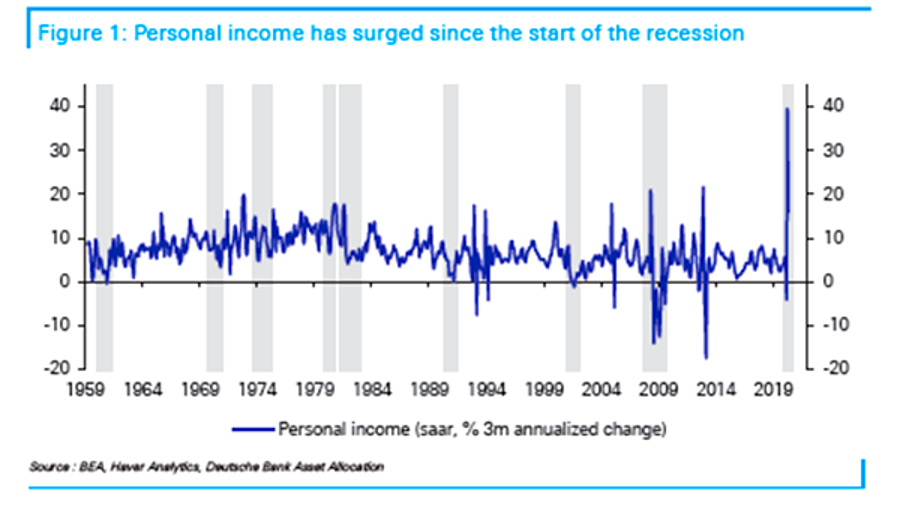
Holger Zschaepitz@Schuldensuehner
The strangest recession in history: Recessions don’t usually result in personal income soaring, but this one has thanks to government support around the world, DB’s Reid says.
6. Half of Buffett’s Portfolio is Apple

Diversify? Almost half of Warren Buffett’s Berkshire Hathaway portfolio is now composed of a single stock

Buffett article https://finance.yahoo.com/news/buffett-dropping-down-world-richest-210340813.html
7. Top ETFs at Half Way Point…Best Performing ETFs Of The Year (ex. leveraged/inverse/VIX ETPs)
Best Performing ETFs Of The Year-Sumit Roy
Data measures returns through the end of June 2020 www.etf.com
8. UAL Mass Layoffs as Airline Traffic Hooks Back Down
Wolf Street
UA’s presentation included the two charts below of new ticket sales for future travel, by “all carriers and sales channels,” based on data by Direct Data Solutions (DDS) through July 2. They show the percentage decline in industry-wide ticket sales for domestic and international travel from the same period last year (in a 7-day moving average). The charts are titled, “Increase in Covid-19 cases negatively impacting industry demand”:
The first chart shows the decline in ticket sales for domestic flights, in terms of the number of passengers (blue line) and dollar revenues by the industry (purple line):
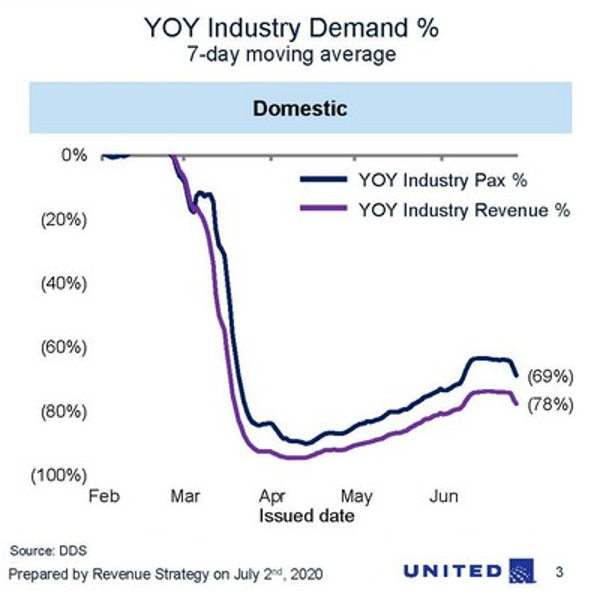
This second chart shows the decline in international ticket sales in terms of the number of passengers:
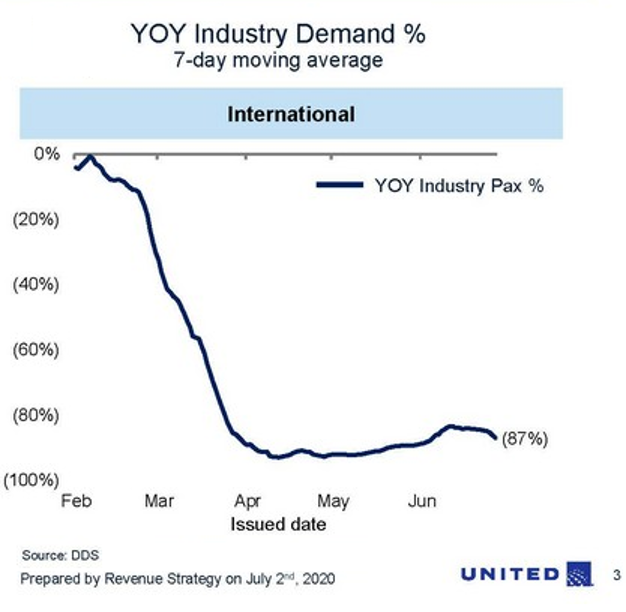
Hotel property loans are the worst hit as much of the travel industry has shut down. The delinquency rate spiked to 24.3% in June, and the sector remains in turmoil, with many hotels still closed (delinquency rates by Trepp):
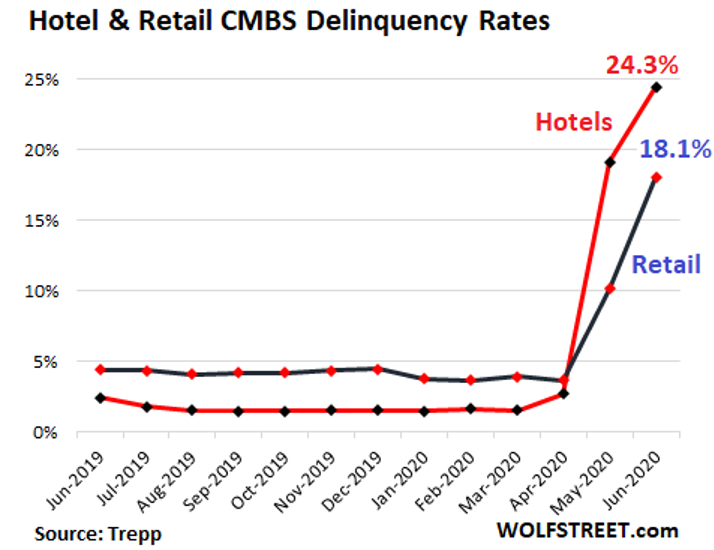
No V-Shaped Recovery for Airlines. Ticket Sales Slide Again. United Announces 36,000 “Involuntary Furloughs”
by Wolf Richter • Jul 8, 2020 • 43 Comments“Increase in Covid-19 cases negatively impacting industry demand”: United By Wolf Richter for WOLF STREET.
9. Struggling to Tame Your Stress and Concentrate? Science Suggests This Type of Music
Concentrating on your work is hard at the moment. Lo-fi really will help you chill out and get more done.
BY JESSICA STILLMAN, CONTRIBUTOR, INC.COM@ENTRYLEVELREBEL
Kids are home, offices are shuttered, and the news is a parade of horrors. That makes the pandemic the perfect recipe for stress and lack of productivity. It also makes it the perfect time for lo-fi music.
If you haven’t heard of the genre by name, you’re probably aware of the general phenomenon: streams and apps promising an endless loop of chill beats to study or work to are booming. One popular YouTube channel, ChilledCow, has more than 5.5 million subscribers, and The Verge has a whole report on how similar channels across the Web are seeing similar spikes.
If you’re looking to calm your nerves enough to actually get something done despite the world’s many distractions, should you jump on the lo-fi bandwagon? While many music critics scoff at the mellow, monotonous music (one annoyed writer dubbed it “apathetic music to make spreadsheets to“), enthusiasts and scientists insist the blandness is the point. For many people, lo-fi really does lull your brain into a sort of productivity trance.
This is your brain on lo-fi.
For dedicated audiophiles, Engadget’s Tim Seppala has a technical deep dive into the exact auditory qualities that make lo-fi so addictive. But if your eyes glaze over at the mention of amplitude modulations and spatialization, the basic idea is this: the wordless music peppered with nostalgic sounds like the “sizzle” of a vinyl record is neither so slow it makes you sleepy, nor so fast it makes you anxious. It’s neither so boring you forget it entirely, nor so interesting it distracts you from your work. Instead it gives your brain just enough stimulation to tune out stress and be productive.
The fact that people generally listen to lo-fi beats on an endless loop also helps create this relaxing effect. Victor Szabo, a music professor who is writing a book about the genre, explained to Elemental that the repetition in the music makes it predictable, soothing listeners further.
The brain can “easily predict on a subconscious level how it will continue to sound,” he comments. “The listener can turn their attention away from the sound and toward other things without being surprised or thrown off.”
The word both Szabo and other music experts use to describe the ultimate effect is “cocooning.” Lo-fi wraps you in predictable, soft sound, protecting your thinking from the unpredictable and harsh outside world. That helps you relax and focus. You get more done as a result.
No wonder these chill beats are suddenly so in demand. A snug, safe space where you can actually be productive sounds pretty appealing right about now.
10. The Dark Side of Happiness
by Dan Solin, 7/7/20
Advisor Perspectives welcomes guest contributions. The views presented here do not necessarily represent those of Advisor Perspectives.
There’s a group of hormones that, when triggered, make us happy. Those chemical reactions make us feel really good.
What’s the downside?
A primer on happiness hormones
These hormones are generally considered to have a positive impact on our happiness:
Dopamine, serotonin, endorphins, phenylethylamine, oxytocin and ghrelin.
In brief:
Dopamine is a neurotransmitter which is responsible for a feeling of happiness. It’s spread along pathways in our brain.
You can trigger the release of dopamine by eating the right diet (rich almonds, bananas, avocados, eggs, beans, fish and chicken), exercising, meditating, getting adequate sleep and even listening to music.
Serotonin: Serotonin is found in the brain, bowels and blood platelets. There’s evidence having adequate serotonin levels is critical to maintaining mood balance.
You can boost your levels of serotonin by exercising daily, maintaining “gut health,” eating foods high in complex carbohydrates and, if needed, taking supplements.
Endorphins: Endorphins are chemicals our body produces to relieve stress and pain. They are triggered by regular exercise, helping others, yoga and meditation.
Phenylethylamine: Phenylethylamine is a chemical found in our bodies. It stimulates our bodies to produce chemicals thought to have a role in mood and attention, among other things. In clinical trials, supplementing phenylethylamine “induced rapid and sustained relief of depression.”
High-intensity aerobic exercise increases the release of phenylethylamine.
It’s also available as a supplement.
Oxytocin: Oxytocin is a hormone that plays a critical role in the childbirth process and in promoting lactation after birth. While the studies are conflicting, there’s some evidence it’s involved in social interactions and the creation of trust.
Being in the company of someone you are attracted to and physical affection boost oxytocin levels. So does petting your dog.
Oxytocin (along with dopamine, endorphins and other biochemicals) is triggered when we are talking about something we want to share.
Ghrelin: Ghrelin is a peptide hormone produced and secreted in the stomach. Its primary function is to increase appetite.
The role of ghrelin on mood disorders hasn’t been clearly established, but there’s some evidence abnormal levels of ghrelin are “linked with stress, anxiety disorders and depression.”
You reduce hunger and cravings by lowering your ghrelin levels. You can do this by prioritizing sleep, increasing muscle mass, eating more protein and maintaining a stable weight.
There’s nothing wrong with following sound guidelines to increase your level of happiness hormones. Doing so may provide temporary relief, but won’t resolve underlying problems.
There’s one exception to this otherwise worthy goal, which brings us to the dark side of happiness hormones.
The dark side
There are hundreds of articles telling you how to boost your happiness hormones. There are relatively few that explain how to do so in others.
That’s the problem.
We all love to talk. We are especially keen to demonstrate our expertise by “educating” others, including clients and prospects.
It feels great.
What about the listener? How do they feel?
Not so good.
According to author Judith E. Glaser, “While we’re being rewarded, the people we’re talking to might consciously or subconsciously feel cut off, invisible, unimportant, minimized and rejected, which releases the same neurochemicals as physical pain.”
Physical pain? I doubt that’s your intention.
You can reverse this process by focusing on getting happiness hormones released in your prospect or client. This requires you to stop talking; stop conveying information; stop the “education lecture.”
Instead, empower the other person to speak.
You will stop the flow of happiness hormones into your brain, but they will be released in the brain of the other person.
While being silent might cause a temporary lack of pleasure for you, the long-term benefits are well worth this minor sacrifice. When you empower others to talk, you’ll be (correctly) perceived as an empathetic, trustworthy and insightful. You also learn exactly what’s on the person’s mind.
And you’ll convert the prospect or deepen your relationship with your client.
You will turn the “dark side” into the “bright side.”
For more information about marketing and branding opportunities with Dan’s upcoming book, Ask: How to Relate to Anyone, click here.
https://www.advisorperspectives.com/articles/2020/07/07/the-dark-side-of-happiness
Disclaimer
Lansing Street Advisors is a registered investment adviser with the State of Pennsylvania..
To the extent that content includes references to securities, those references do not constitute an offer or solicitation to buy, sell or hold such security as information is provided for educational purposes only. Articles should not be considered investment advice and the information contain within should not be relied upon in assessing whether or not to invest in any securities or asset classes mentioned. Articles have been prepared without regard to the individual financial circumstances and objectives of persons who receive it. Securities discussed may not be suitable for all investors. Please keep in mind that a company’s past financial performance, including the performance of its share price, does not guarantee future results.
Material compiled by Lansing Street Advisors is based on publically available data at the time of compilation. Lansing Street Advisors makes no warranties or representation of any kind relating to the accuracy, completeness or timeliness of the data and shall not have liability for any damages of any kind relating to the use such data.
Material for market review represents an assessment of the market environment at a specific point in time and is not intended to be a forecast of future events, or a guarantee of future results.
Indices that may be included herein are unmanaged indices and one cannot directly invest in an index. Index returns do not reflect the impact of any management fees, transaction costs or expenses. The index information included herein is for illustrative purposes only